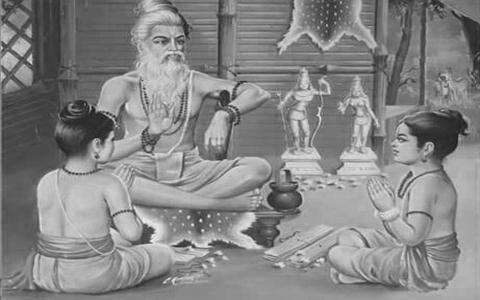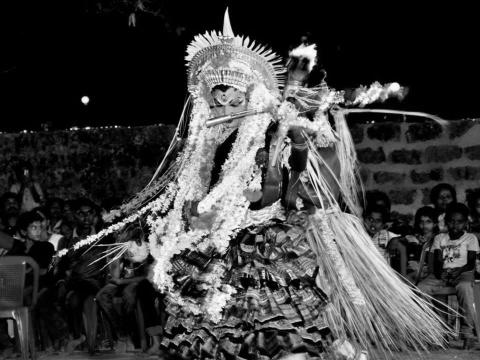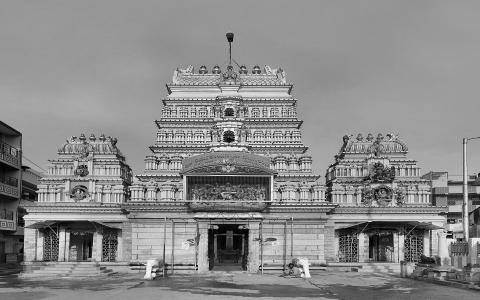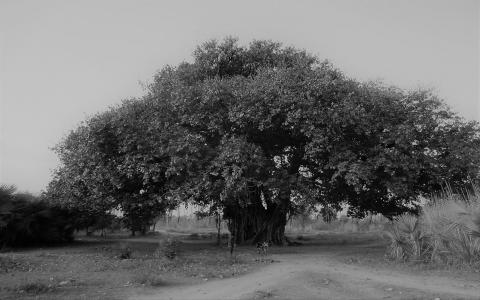November 2018

Upanayana in the Saṃhitās
Some of the characteristics of the upanayana described in the gṛhya-sūtras are seen in the Ṛgveda-saṃhitā itself.[1] The sacrificial post (yūpa-stambha) is praised as a young person – “Here comes the youth, well-dressed and encircled (the boy by his mekhalā and the post by its rasana); he, when born, attains eminence; ṛṣis, full of devotion to the deities in their hearts and entertaining happy thoughts, raise him up.”[2...

Several people have the tendency to find parallels between Bhūtārādhana and Yakṣagāna. They classify Bhūtārādhana as ‘folk’ (Jānapadīya) and as a corollary, conclude that Yakṣagāna is ‘folk’ as well. However, Yakṣagāna’s allied forms of art such as Terukkūttu, Kūcupuḍi, Bhāgavatameḻa, Dūḍālapāya, Doḍḍāṭa and Keḻike are not influenced by Bhūtārādhana at all. Among these, one can say that only Kathakali has faint reflections of Bhūtakola in it....

Sri Mahadeva Sastri was the elder brother of Motaganahalli Sri Sankara Sastri. Even he was highly accomplished in music and literature. Every Ekadashi a Bhajan programme would be organized in his home. In this case, the word “bhajan” must be understood as music.
The ancestors of the Motaganahalli lineage were Vidwans, connoisseurs, and singers. One of these ancestors Sri Mahadeva Sastri had earned the honorific of “Abhinava” [Modern/...

Worried that the citizens of Ayodhya may yet again come to the forest, Rāma left the great forest, went to the banks of the beautiful Godāvarī river, and began residing near the āśrama of Sage Śarabhaṅga. Owing to Śūrpaṇakha, Rāma makes an enemy out of Khara, who was residing at Janasthāna. Rāma killed Khara, Dūṣaṇa, and thousands of other rākṣasas, thus making that dhārmic forest safe for everyone. Śūrpaṇakha, with her lips and nose chopped off...

ಕೋಲಾರಮಂಡಲದಲ್ಲಿ ಹೆಚ್ಚು ಪ್ರಚಲಿತವಿರುವ ವಾಗ್ರೂಢಿಗಳ ಬಳಕೆ:
ವೆಗಟು / ಎಗಟು (ಹೆಚ್ಚು ಸೇವನೆಯಿಂದ ರುಚಿಗೆಡುವುದು), ಅಂದಿಸು (ಎಟಕುವಂತಾಗಿಸು), ನಸನಸೆ (ರಂಪ; ಸಣ್ಣ ವಿಷಯಗಳನ್ನು ದೊಡ್ಡದು ಮಾಡುವುದು), ಸೊಟ್ಟಾಪಟ್ಟೆ (ಓರೆಯಾದ, ಡೊಂಕಾದ), ಪೋದಿ (ಆರೈಕೆ), ಮೊಡಕು (ಮೂಲೆ), ಐಲುಪೈಲು (ಹುಚ್ಚು), ಯರ್ರಿಬಿರ್ರಿ (ಶಿಸ್ತು ಇಲ್ಲದಿರುವುದು), ಪೀಕಲಾಟ (ತೊಂದರೆ; ಜಗಳ), ತಕರಾರು (ಆಕ್ಷೇಪಣೆ; ವಿರೋಧ; ಜಗಳ), ಏಮಾರು / ಯಾಮಾರು (ಮೊಸಹೋಗು; ಉಪೇಕ್ಷಿಸು), ಚಿತಾವಣೆಗಾರಿಕೆ (ಪ್ರಚೋದನೆ), ಪೊಗದಸ್ತು (ಸಮೃದ್ಧ), ಅಳ್ಳಕ (ಸಡಿಲ; ದ್ರವೀಯ).
ನಾಮಪದಗಳಂತೆ “...
- « first
- ‹ previous
- 1
- 2
- 3
